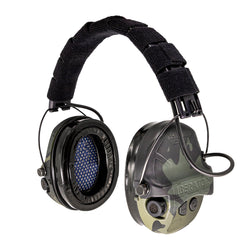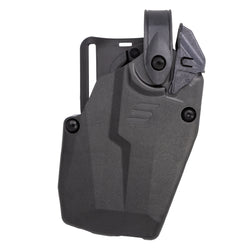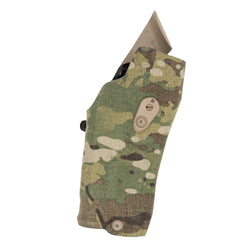The Smith and Wesson Model 39 wasn’t the first semi-automatic pistol from S&W, but it’s often called the pioneer of the first generation of pistols. The pistol made quite the splash and ushered S&W into its generation of success.
The Model 39 quickly became popular, and custom firearm manufacturers got their hands on it to make a number of highly customized models. Five famed custom Model 39 variants focused on concealment in one way or another.
the Custom Model 39
In World War Two, the Germans fielded the Walther P38. The weapon’s first shot utilized a double-action trigger pull, and subsequent shots were single-action. Fascinated by the DA/SA system, the Army Ordnance Corps proposed an American DA/SA 9mm handgun. S&W began development in 1949, and in 1955, they released the Model 39.

The Army passed on the gun, but it did see some military success. Specifically, the Navy adopted the gun in small numbers for their newly created Naval Special Warfare SEAL Teams. This leads us to our first custom Model 39.
The Hush Puppy
The Mk 22 Mod 0, aka the Hush Puppy, took a variant of the Model 39 and propelled it to the future. Concealment comes in many forms, and in this case, the SEALs weren’t trying to hide their guns. They were trying to hide their positions. Naval Special Warfare built the Hush Puppy as the ultimate silenced gun for dispatching sentries and guard dogs.

The Mk 22 came as standard single-stack variants, but the more common model used a modified frame and a 14-round magazine. They installed an extended threaded barrel to attach the Mark 3 suppressor. To aid in eliminating noise, there was an option to lock the slide closed to prevent it from moving back and forth.
They installed raised sights to ensure the gun was accurate and even produced an attachable shoulder stock. They paired the gun with subsonic 9mm ammo. The gun hung around the SEAL teams until after Vietnam and inspired the double-stack S&W Model 59.
The ASP
Paris Theodore might be the most interesting man ever to live. I could write an entire article about him.
His claim to fame was concealment systems. He aimed to design the lowest-profile fighting pistol possible and built custom Model 39 pistols for the most discerning customers. One customer included the Commanding Officer of the American Embassy Security Guard detail in Saigon.

The ASP pistols featured shorter slides, with .75 of an inch removed from the barrel and slide. They also shortened the frame and decreased the magazine capacity by one round.
The grips were replaced with clear Lexan panels, and the magazine had cut walls allowing users to see how many rounds were inside. They cut the hammer to sit flush with the slide to prevent snagging when drawing.
They chopped the sights off the ASP. Instead, there was a Guttersnipe sight. It used a U-channel trench that got narrower. Yellow paint helped orient the shooter downrange. From the ground up, the ASP was built to be concealable, quick to draw, and fast on target.
The Devel
The ASP Led to the Devel pistol. A gunsmith named Charles Kelsey ordered an ASP but never received it.
He decided to build an improved version and teamed up with legendary gunslinger Ken Hackathorn to do so. Kelsey was an accomplished gunsmith, and with Hackathorn at his side, they worked to develop an improved version of the ASP. This led to another series of custom Model 39 pistols and custom models of the S&W 59.

They produced various levels, and the Full House Model represents the premium tier. Like the ASP, they trimmed the barrel and frame to reduce the size. The Devel trimmed the barrels to 3.5 inches. They replaced the grips with Micarta grips with a small, clear window to observe magazine capacity. The Devel kept the sights but made them lower profile in nature.
They changed the trigger guard by adding relief cuts and modified the trigger into the famed S-shaped design for better ergonomics. They trim the hammer to fit flush with the slide. The Devel featured internal improvements with high-quality springs and an accuracy-improving barrel bushing.
The Scorpion
The Scorpion custom Model 39 pistols, also known as the Trappers, were custom compact guns. Like the Devel and ASP before it, the gun aimed to provide a trimmed Model 39 for concealed carry. The man behind the Scorpion pistols was Lin’ Trapper’ Alexiou, who produced the guns in Michigan. These are the rarest custom Model 39 pistols.

The Scorpion ditched the idea of clear grips and specially modified magazines. They offered a 3.25-inch barrel, cut the frame a bit, and lowered the capacity to seven rounds. They also trimmed the overall height to 4 ⅜ inches total.
The gun typically cut the stock grips and simply cut them down to fit the smaller grip, but custom Darlin grips were an option. Shooters also had their pick of sights, from standard to Millett combat and even guttersnipe sights.
The Scorpion series had bobbed hammers and a hooked trigger guard. They melted the corners for better concealment and snag-free draws. The action was reworked and tuned to draw out greater performance. Most of the guns featured either the word Scorpion engraved on the slide or an actual scorpion.
The Behlert
Austin Behlert was one of the few men who could claim the title of master gunsmith. He made functional art and was famous for a variety of custom guns. Seeing a market that was clearly popular, he tackled both the Model 39 and the double-stack Model 59. The custom Model 39 and 59 guns were known as the Mini Combat pistols.

Behlert started the customization by trimming the barrels and frames to create the now stereotypical compact Model 39. The barrel and slide were trimmed to 3.5 inches.
He bobbed the hammer, melted the edges, and lightened the slide with grooves. Behlert custom cut finger grooves, and reshaped the trigger into a hook. There are no clear Lexan panels to see your ammo; they are just standard wood grips.
The sights were low-profile, with the rear sight pushed rearward and the front sight pushed forward as much as possible. This increased your sight radius overall.
Internally, Behlert reworked the guns and improved just about everything. The triggers were reportedly fantastic, and the guns were very well made. They certainly fetch a premium these days.
The End of the Custom Model 39
While all five of the custom Model 39 pistols were aimed at concealment, four were designed for concealed carry. With that in mind, S&W clearly saw the gun’s potential as a concealed carry gun and produced the 439, a concealable Model 39. The custom-produced Model 39s were never made in great numbers, but they represented some fascinating ideas regarding concealment.









